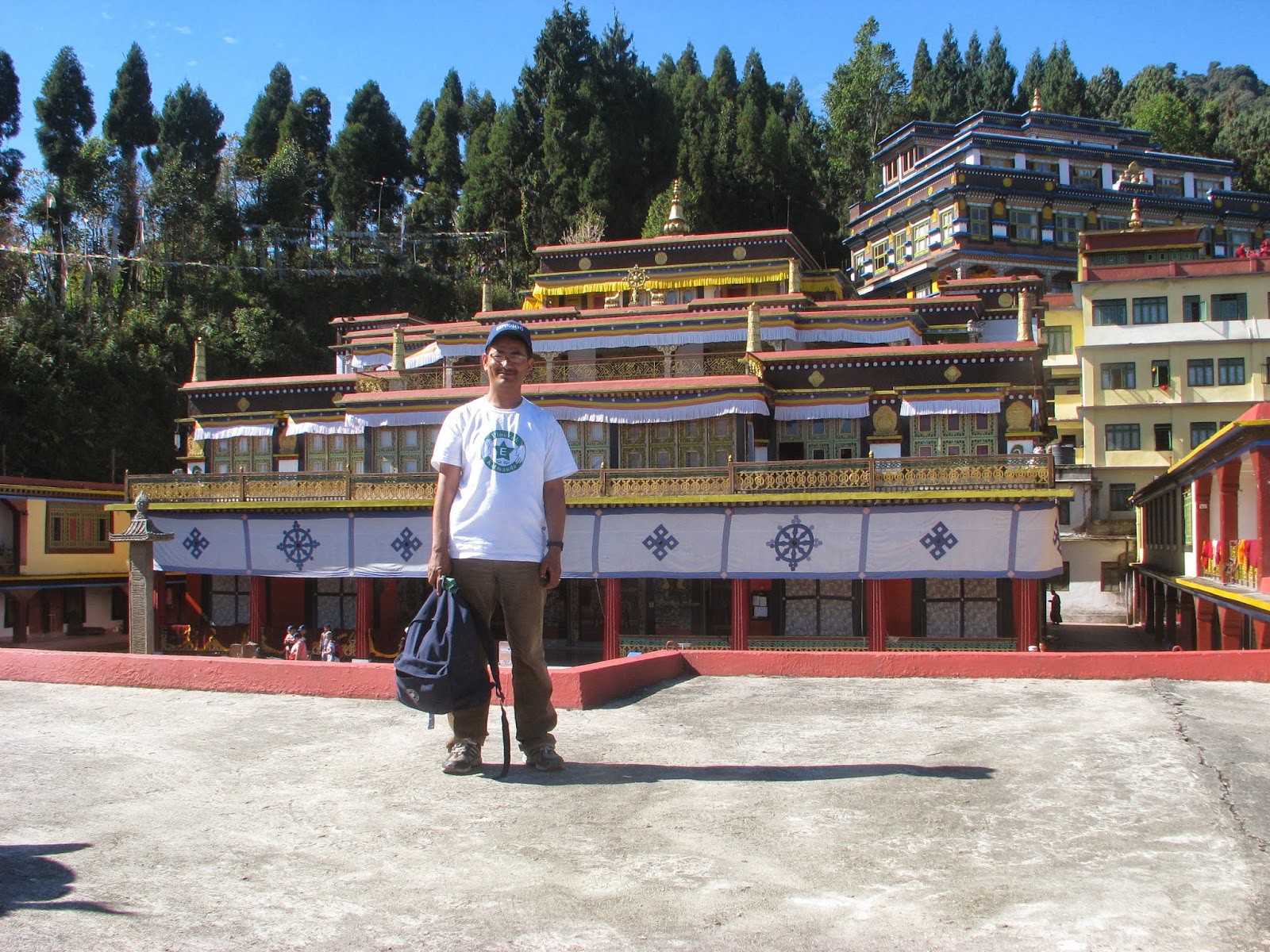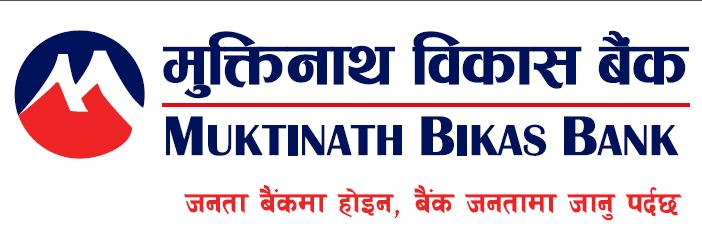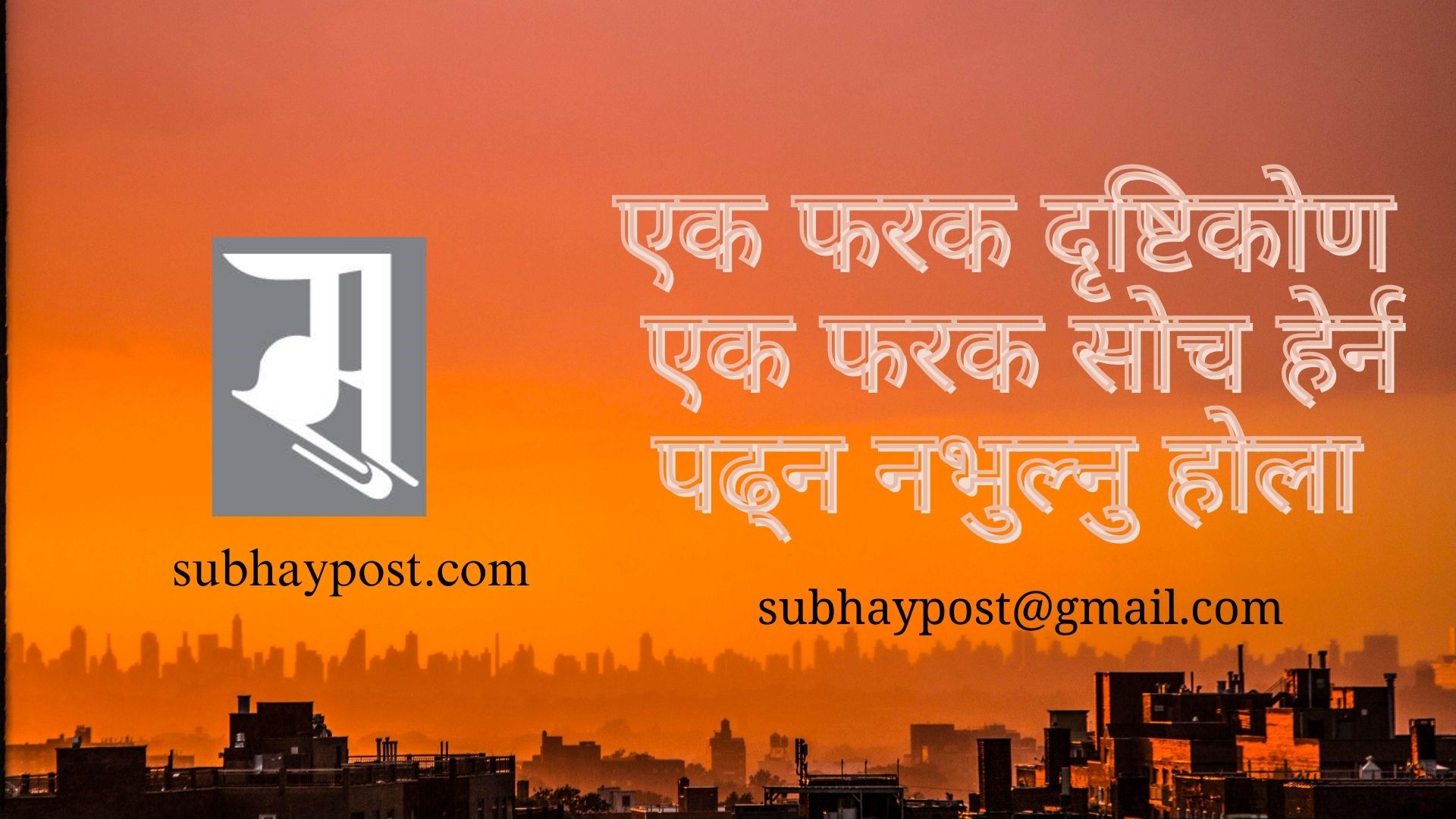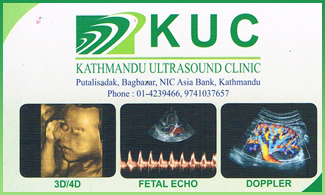
Razen Manandhar
It is as if my old love is attached with Sikkim. I fell in love with that distant hilly town long before I knew how to distinguish between love and hate, some 18 years ago. I naturally become nostalgic. Even a flickering fancy of touching the pleasant earth of Sikkim once again gave me tickling pleasure. An excursion to Sikkim with some Esperantists (speakers of Esperanto) from different countries, mainly from France and Germany, was organized in November 16th to 26th, 2013.
Series of procrastinations took us to the date of historic election of Constituent Assembly. What to choose? Either utilizing right to vote and participating in this important event or roaming around refreshing Sikkim, talking with international friends in Esperanto — choosing one is not easy thing.
Everyday I read the newspapers, listened to the radio or watched the TV. I found the same — same parties, same manifestos and old dry speeches. They were not giving what the people sought, and the people were not ready to accept what they had in their hands. Those who should have come up and should have brought what the people needed failed to make a height. After all, only the thing will take place what the foreign forces want — this is my country. Our duty is only to flatter an old pair of sun and moon in the air. I made my determination — that would not cast my vote this time also. At the time of previous election, I was assigned to report from Khoplng, the village of Dr. Baburam Bhattarai. Now, I’m free to boycott. Either somebody is coming or not, I decided to go to Sikkim, so that I would escape possibility of smearing my own face with insult. I said — I’m going to my Sikkim.
We had nine guests, from France and Germany, all speakers of Esperanto, the international language. As per our notifications, all guests arrived on November 13th. Amid protests, strikes and bomb blasts, they went to Baudhha, Taudaha and Chobhar, enjoyed the traditional dance of Katti Pyakhan and on the second they, they went to Hanumandhoka palace, Changunarayan temple and Bhaktapur. Being with them, talking with them, and telling them about history and culture of Kathmandu — this is Esperanto.
Telling that I was going to Sikkim in Facebook brought to me some pretty jobs — I was supposed to take some gifts to my friends of friends in Sikkim. Mostly books, from Shakya Suren, Raja Shakya, Shashikala Manandhar and Bhishma Upreti were to be taken there. In fact, I will be carrying a bunch of love for Newars of Sikkim. Short conversation with Surendra Pradhan, Meena Pradhan and Rajiv Shankar was going on, thanks to Facebook.
I was standing in the domestic lounge of Tribhuwan Airport on November 16th. It was a cool morning. Time has changed but it was an unchanged heritage of Nepal. I guess Nepal government should draw fee from tourists even for observing this dilapidated lounge. I saw more things for cargo than passengers. As there was no herald of development and people have made a habit of depending on foreign goods, those who carry Nepali citizenship have no other option than waiting for airplanes even for their daily needed good. From noodles to beer, onion and toilet paper — all have to fly in Nepal. And we now and again sing the same old song that there will be development in all corners, from Mechi to Mahakali.
Forty-five minutes of flight took us to Bhadrapur, Jhapa. It was as hot as fire is flowing in the wind. The vehicle we have ordered took us to Kakarbhtta border. Nepali border was all right. But it took around two hours get arrival stamp on nine tourists who have already obtained visa in their respective countries. That was the reason we asked repeatedly all guests to obtain Indian visa before they leave their country. Rule is rule.
We had a late lunch at a beautiful motel in Motel in Silguri and our Toyota 4hd vehicles were plying along the Tista river. Tista was flowing outside and Bagmati was flowing inside me. How can I just forget my beautiful city? The road along the hill was being widened. Never-ending pairs of hairpin bends — there was roaring river down and when you look up, you see cliff rising to the height of the sky. Mind was excited to see Sikkim, but tour vehicles were heading in a tortoises’ speed. At least I thought like that. It was just like Angulimala was running after the Buddha.
What is this Sikkim? Guru Padma Sambhava had said all about it. The royal dynasty of Chogyals established it established in 1642. At times, it was a target of Nepal and at times it became the bull’s eye of the British empire too. They say that the country was not developed when it was ruled by the Chogyals. And the British government took charge of protecting it.Development made speedy height after it turned into a state of India in 1975, people of Sikkim often tell us this perspective of history. Yes, after that, it witnessed a rapid development. It requires people’s will, commitment of the leaders and location strategic importance for development of a state.
It as almost dark when we reached Rangpo Checking Point. Even though Sikkim is India, all foreign visitors need “inner-line permit” to enter Sikkim. Nepali citizens also need. I’ve been here two times but I never sought, neither they checked me up. I was in local buses and nobody cared if I was a Sikkimese or not. But now, it is not possible, I was in an “imported” vehicle with foreigners. The officers in the point made permission for me too. It took more than one hour there for us to be permitted to enter Sikkim.
I friend of mine was supposed to wait for me at bus park. Now, it was clear that it would not be possible to see him today. So, took cellphone of the driver to tell him that I would meet him next morning.
It was 8.30 pm when our vehicles stopped in front of the hotel. The alley was quiet, dark and also cold. Fatigue, sleepiness and darkness killed my curiosity to greet Gangtok. I dragged my baggage and myself to the room. I didn’t even look how it looked. I could not see the building and don’t even know the name. Yes, I saw name — Hotel De La Mare — somewhere.
The room was gloomy. The light was insufficient to read a book. We three Nepalis accommodated ourselves in one room. An unbearable cold shower made me fresh.
We distributed caps to all foreign guests. It was quite comfortable to fight breeze. Impatiently we waited for the dinner. When it came, it came in good shape and also was delicious enough to kill my hunger.
We had jolly dinner in a long dining table downstairs. I had no idea of the engineering of the house. Houses in hillside always have complicated structures. Just like my mind at that time, quite complicated.
November 18th, Monday. I myself became Nepal when I saw people in Sikkim. As if, I was in Nepal, or as if, Nepal was inside me. I know seeing Nepali speaking people with Dhaka cap is normal there. That is why I brought a Dhaka cap form home. I reluctantly accept to wear Dhaka cap at home even when it is a must, during rituals of sagan, for example. But here I was excited to wear it; it gave me a noble pride to walk along the road with the cap on my head. It gave a affectionate feeling when I saw some middle-aged men showing up with the caps. I just wanted to tell them that I am not different. Poshraj and Hari usually wear it but I don’t. They didn’t feel awkward, but it was too much for me to showcase my Nepaliness in Gangtok street. I felt like everybody there was staring at me, I was a bizarre unwanted creature there. I was afraid if somebody would mock me, somebody would kick me.
I did not actually know what I wanted to show by wearing Dhaka cap there. Does nationality means this cap? Who should I show my nationality here? If nationality is embodied into this cap, what about those Nepali ethnic groups who never wear this cap? Does this mean that their blood they shed for making my country is not defined as nationalism? Then why on earth I’m showing my nationality crowned with this cap in Sikkim? I felt this cap was burning me from inside. I removed the cap and tugged it inside my pocket. I hid my showpiece nationalism. Then I felt the whole sky is my, my nationalism.
Our today’s plan was to visit Phodong monastery. But when I stopped at Tashi Viewpoint, we all enjoyed the panorama of the Himalaya so much that we loved to spend whole day there. We agreed to forget everything. There was a shop, which had traditional Bhotiya dress on hire. Many of us wore them and posed for photographs. I preferred to remain out of the box. I liked the way I was wearing.
It was nearly 11 am when we finally reached the jungle of Kabi Langchock, the place where Bhutiyas and Lepchas, two of the indigenous peoples of Sikkim, tied themselves to new relation of brothers. As the story has it, they met on this point and promised that they would remain faithful brothers until there is water in the Rangit river and snow in the Mount Kanchanjengha. They said that they would remain blood relatives. It is thus a place to visit for the concerned communities and the government of Sikkim also has declared this as a “shrine”. In the shadowy jungle, the big concrete sculpture was majestic.
The problem of language took a provoking shape today. It was agreed that the guide would explain things in Nepali and I would translate it into Esperanto. But our guide Sanjiv was explaining in English that only a few in our group could understand. Pascal understood English and he translated it directly into French for his friends, that means nobody except French friends were benefitted. Finally Ursula raised voice.
I had to intervene and said that from now onwards the guide would not speak in English and I would take charge of explaining everything into Esperanto. Language is such a sensitive issue for them and nobody tolerates domination by others’ language there.
Half an hour’s drive passed and we stopped at a waterfall called “Sat Kanya Jharana”. We refreshed ourselves with sprinkles of that elegant waterfall. I know Indians from the plains get excited when they see water fall on the road.
We arrived at the old monastery of Labrang. It was located in a quiet hill, looked small but completely different. Thanks to remoteness and probably strict chief monk, it has not been encroached by modern technology and materials. Unfortunately, it sustained some physical damages in the earthquake that rocked Sikkim two years ago. Slowly reconstruction work was going on. Some young monks were painting on wooden bars in the tender sun.
A place where one has to walk for whole day to reach and where there is no public transportation service — this is the secret of the monastery being so untouched and so beautiful. People spend their life there in the name of religion. They may not even have proper foodstuff, and shelter is so poor — most probably it snows there in the winter. And those young novice monks. I started thinking about Buddhism in my area, where monkhood is always associated with urban setting. When are our monks going to learn to reside in solitude and practice real Buddhism, instead of expecting luxury donations or benefits from the limited followers?
I could see that Pascal was feeling uncomfortable to see novice monks, playing in the warm sun. He came to me and asked — what do they eat, who does take care of them? How much do they study? Do their parents visit them? I replied as much as my conscience had idea about general monkhood of Tibetan Buddhism. I said, “Yes. It is undoubtedly a difficult thing for parents to send their children to this severe distance for studying Buddhism. But see this is the reason we have monks who are determined to contribute for Buddhism throughout their lives. And Buddhism is spreading all over the world.”
Then we headed to Phodong monastery, some 38 km north of Gangtok. This is one of some noted monasteries in the whole state. Have it constructed in the 18th century by Chogyal Gyurmed Namgyal, it is associated with Kagyurpa sect of Buddhism.
The main monastery is majestic in the solitude. Young monks were studying in a classroom nearby. They were busy reading some texts in Tibtean scripts. They see their lives in those books — yes, one single life is not enough to have complete knowledge of Buddhist philosophy. That is why they tend to take birth again and again, probably, being an autari lama. If study of religion had competed, religion itself had been eradicated.
Visiting monasteries give us a new and different kind of experiences — they live there with all basic needs. They never go for other luxuries. They read, they eat and worship. They make their own happiness inside the boundaries. Why should somebody look for other when they can find their happiness within themselves? Contentment is the most precious happiness in human life. They chant mantras — in one rhythm, in one tempo. They could be hundreds in number but they have one voice. This voice comes from their sincere devotion and this sincerity is simply taking refuge to the Triple Gem. Even though I couldn’t understand their language, I could feel the hypnotism in the environment surrounded by the monks’ chantings. What else it could be if it is not the message of peace?
It was good that we completed today’s program earlier. I have a special meeting to attend. An appointment with some of prominent Newar leaders was fixed. I was contacting some of the known names here. Mr Surendra Pradhan visited me at the hotel room. And we fixed today evening rendezvous. It indeed a surprise visit from him to my hotel room. And we set time for today.
Meena came to my hotel at 5.30. She even brought a packet of gift for me. She took me to Mint Tree Mountain Restaurant, located at a busy crossroad near the hospital. But we found ourselves in a quiet big and gloomy hall. One after another, activists of local Newar movement came. We alltoghether became eight. None, except Meena, who once lived in Kathmandu and studied Newari script for sometime, spoke in Newari with me.
I grabbed an opportunity to ask about Newar society in Gangtok or in Sikkim as a whole. Even though they are not very much concerned about learning Newari and using it, they have keen love for their culture, food and dance etc. They are living their style of life, in this mixed multi-ethnic scenario. What is important now is that they have the feeling that they belong to the community called Newars. And, the government also is helping them to promote their language and culture.
I handed over the bunch of books I had for Sikkim Newar Guthi, including two books, written by me. Hope, they will have space for these papery love for Newars of Sikkim from those from Kathmandu. Pradhan ju gave some copies of Souvenir of Sikkim Newar Guthi.
While talking with them, I forgot to handover the gift of Bhishma Dai to Rajendra Bhandari, a local Nepali writer. I would not have more time to search for him. So I requested Meena to accomplish this talk of taking the packet of the books to Mr Bhandari.
November 19, Tuesady. I actually have not arrived here, and the time has come to depart. I can’t say whether I’ve stayed here or not. And god knows when I will be here again. I just want to hug her tightly. I have a dream of staying here long and write some concrete about local Newar society. I don’t know when it will end in dream. I feel shy even to bid farewell, she will say — don’t go, stay here for some more days. Or, will she bind me with her chain of love?
In the early morning, I went to return the Sim card. It is certain, I am going to checkout the room of Dela Mare. What the hotel, I’m saying good bye to Sikkim itself. I wish I could take a handful of this cleanliness, good-governance and peace to our Nepal. I grasped a handful of air, I will spread this love in Kathmandu.
On the way back in vehicle, my mind wandered. Some people are afraid that we are introducing “ethnic” provinces in Nepal. What is this? This is a state of India, where even Indians from other states cannot easily enter. So, they don’t have people who litter, spread merchandise in the street and do politics of disintegration and integrity. Their population in the whole state is around 6 lac and 10 thousands, as many as one of the constituencies of Kathmandu. That means, they enjoy all the resources, opportunities and they obviously enjoy peace, governance and development.
In Kathmandu Politicians often talk about “Sikkimization” as an example of colonization. But people here don’t know what is Sikkimization; if they know it, they know it means development, employment, esability and peace. I don’t know if it is what was seen by Marco Pallis or BS Dass, or seen by me. God knows, what people should be. On the other hand, how many people say that the state belongs to them? 80 percent of them are people from Nepal. We are there raging war for power, they are here in power for development. History remains, time passes; as our vehicle is passing.
At noon, we are in a new world. We felt something tasty is coming in our nostrils. Tea farms are dancing around and welcoming us with wide smiles. It was the snacks-time of Nepali-speaking tea pickers there. They were gossiping, laughing and eating by the roadside. They are taking rest and also reenergizing themselves.
Kanchenjunga came closer to us. It was 3 pm when we finally reached Batase Loop. We just came out and Chhukchhuke train of Darjeeling passed away, galloping. The Martyrs’ Memorial at Hillcourt — the monument to remember brave Gurkha soldiers who sacrificed themselves for India’s freedom. It is the place for Nepalis to remind that we are Nepalis and that there is wound in every war.
The wind was blowing strong. Still, the monument was standing erect. The mourning solider did not feel cold. And the three-coloured Indian flag was standing gracefully. Two and a half dozen names of Gurkha solders were sunbathing on green grass. Our brave solders, can’t fight for their countries, but here, they are brave enough for others’ liberation. Used and thrown, Gurkha solders. In one sense, it is rational — they fought for their country. The difference my eyes could not catch is that their country was not my country. Who where lives turns out to be his or her country. That much of loyalty they do carry.
Narrow gullies, line of vehicle and besides, raw of parked vehicles by the roadside — all these show that we were no more in Gangtok. What a change — that is where administration matters. We finally arrived at our Seven Seventeen Hotel at 4.30 pm. It is small but beautifully decorated, a small piece of Tibet, indeed. Directly I plunged into the bed and took a short nap, I was so tired with all day traveling.
The TV mounted on the wall had a Nepali channel and was giving us updates about the election of the Constituent Assembly. I could not escape. It said the election was held and people’s participation was encouraging. The threats of CPN-Baidhya turned out to be meaningless. I don’t know, I only feel that this election is not going to be prosperous. Then somebody might ask, what till the date has been prosperous here. The same thing will be done by all. Just a couple of day ago, I was reading “Sikkim Gatha” by BS Dass, I am afraid of elections.
Half an hour later, all said they want to go outside for strolling. After lying on the bed, I did not have mood to get up, but I dragged myself out. Chilly breeze was tickling. There was a Shakya Jewelers’ opposite of our hotel. Just like lanes of Kathmandu — it was like a dumping site. Some cables handing across the streets, narrow lanes, tall buildings. On the streets too, the passers by look quite bizarre.
We arrived at Chaurasta, the famous open square of Darjeeling. We are happy to see statue of Bhanubhakta. His still standing, just like I saw him many years ago. We entered tea-shop named Golden Tips. The have a system of giving us tea of different tastes in tiny cups. All free of cost but we are expected to buy tea later. We could buy tea of our choice. But it was damn expensive. Tea is expensive thing.
We walked along the series of shops. Some of the commodities are from Nepal and China; most were Indian. If one can buy everything here, nobody would like to travel in India or China. The market was not really good, but I had to busy some gifts for my family. They reminded me of my home and family. I suddenly reached my home. I am in my home again.
November 20, Wednesday. Despite of my fatigue, I could not remain in the room. News of election was like piercing in my ears. I jumped out of my bed and suddenly went out of the room and strolled along the streets. It was quiet but untidy. Why one city is clean and other is so dirty? The same Nepali-origin people in Gangtok are tidy and here why is this Darjeeling is left so filthy by the same community people? I climbed down the hill up to the bus station. Stood by the roadside and bought a cup of tea. Mud, dirt and shops along the open drain — I found myself amid these things when I tried to climb up. Management come along development and mismanagement also follow. Darjeeling is now at this stage.
Some posters of freedom are stuck on the wall. This place has may fortunes and destinations — some want independent Gorkhaland, some want to be annexed to Sikkim. But those Nepalis-speakers in West Bengal have not been able to call themselves independent. And who knows, who is how much free in India.
We returned through Sonada — vehicles squeezed in crowd, people with Nepali faces scattered in the warm sun. And many more were those who looked like Bengalis. Roads are all same — full of bumps and pools.
Watched much-talked Keorsang through the vehicle window. I was too tired to get up and to take some pictures. Then we left for a land of green carpets — a beautiful piece of heaven. Coming down to serpentine road — Rohani Marg — is it taken there as an example of commitment to development in the most harsh topography.
The more we were done, the more hot we felt around us. The air became hot and also irritatingly unwelcome. I don’t know when I fell asleep in the vehicle. We were at Ranigunj, all plains, the customs office at the Nepal-India border. Leaving India was not that difficult for foreign friends. We all entered Nepal. A sigh of relief for us, even though, at least this time, I did not have to face any problem.
Without delaying we grabbed one micro-bus. Dealt price and hired it till Chitwan. It was like galloping horse. We had most of our luggage on the roof, still we were sandwiched with our uneasy luggage. We were just like helpless chicks trapped under a basket.
Nepal’s roads. The same old with series of potholes, chopped. Those who have taken to the destination of Constituent Assembly by showing similarly chopped road — who would they take care of our roads? Nepal’s road and road to Constituent Assembly are similar. Our vehicle was heading toward the Constituent Assembly.
It was midnight when we finally reached Sauraha of Chitwan, all were so tired that we could not even stand properly. God knows what w ate and if we really slept.
(Translated by the author from the original travelogue in Nepalbhasha, Published in Naali bi-monthly in 1134 Thinla 9/2 (68) “Refreshing Sikkim” in 2014/01/14)




सुभाय् मिडिया प्रा.लि.
ताम्सिपाखा , देयको , पुष्पलाल पथ काठमाडौं -१८
ईमेल: [email protected]
कार्यालय फोन- ०१-२१५६४४
स्थायी लेखा नम्बर- ६१२२८०१००
सूचना विभाग दर्ता नम्बर: ४५८/०७४-७५